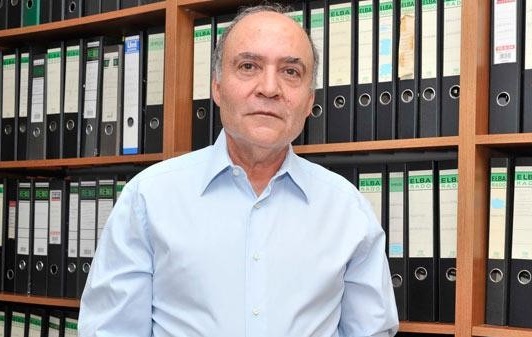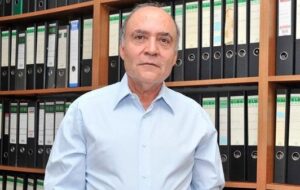
Interview with Toumazos Tsielepis
Sunday 31st January 2016, “HARAVGI” newspaper
 Interview with Toumazos Tsielepis, member of the Secretariat and Political Bureau of AKEL, Head of the Bureau on the Cypriot problem of the C.C. of AKEL and International Law expert, who took part in the meetings held with the Turkish Prime Minister and the Turkish Foreign Ministry, during THE visit to Turkey of the delegation of AKEL, headed by Andros Kyprianou, General Secretary of the Party..
Interview with Toumazos Tsielepis, member of the Secretariat and Political Bureau of AKEL, Head of the Bureau on the Cypriot problem of the C.C. of AKEL and International Law expert, who took part in the meetings held with the Turkish Prime Minister and the Turkish Foreign Ministry, during THE visit to Turkey of the delegation of AKEL, headed by Andros Kyprianou, General Secretary of the Party..
———————————–
The goals of your visit to Istanbul were from the beginning clear. Did you fulfil them?
TT: We did not go to negotiate. We went to Istanbul in consultation with the President of the Republic on what we were going to do. We also deliberated with the Greek Foreign Minister, particularly with regards the issues concerning security. We had set two goals: to convey our interlocutors what we expect Turkey to do for the Cyprus problem to be solved. Secondly, depending on their reactions to what we would say to them, we will perceive whether Turkey means its declarations when it states that it wants a solution.
What conclusions did you draw? Does Ankara acknowledge that it is also in its own interest to find a solution?
TT: Both Ahmet Davutoğlu and Mevlüt Çavuşoğlu took care in every way to convey the message that Turkey wants a solution and that it wants now. Since they know that we doubt whether they mean what they say, they appeared quite firm on this position of theirs. Their analysis is roughly the same as ours. Namely, that the solution of the Cyprus problem is in Turkey’s interest. Çavuşoğlu, in an indirect but clear way, told us that they are captive/stuck on the Cyprus problem, that their hands are tied, that they cannot play the role they want to in the Eastern Mediterranean and the wider region, that Turkey’s European perspective is being blocked, that they have a multitude of problems and that the time has now come to solve the Cyprus problem.
Should we believe them?
TT: In that they want a solution, we do believe them. We believe them because this is in their own objective interest. The question that arises is how far will they go and how do they perceive the solution itself.
You saw the two Turkish officials separately. Therefore, you can also evaluate how each one approaches the Cyprus problem.
TT: They both had a common approach on the core issues, with shades naturally. Regarding what we stated in the discussion and the internal aspects of the Cyprus problem, the response from both of them was the same: namely, that they do not want to intervene in this matter and that it is something that we must decide together with Akinci.
Does Ankara support Mustafa Akinci?
TT: They support him by all means; this is what they told us. And they assured us that whatever the Turkish Cypriot leader decides, they will accept it. They will not raise obstacles and not reverse something that Akinci will accept. We are always referring to the internal aspects of the Cyprus problem.
On the issues of security and guarantees, however, they want both a say and a role…
TT: Precisely. Turkey’s position is that this issue should be discussed at the end. They recognize that the Greek Cypriots have a problem of security with Turkey and they accept this. At the same time however they were also urging us to recognize that the Turkish Cypriots also have an issue regarding their security after the solution. They reminded us of what happened during the period 1963-1974. They were telling us that this is a small community and it is logical that it should have concerns. At the same time, however, they were saying that they are ready to discuss this issue too.
Did they raise the Treaty of Guarantee and the issue of rights of intervention on the table?
TT: They know what our concerns are. And therefore we interpret as follows their stand. On the one hand they are insisting on their positions – at this stage at least – but at the same time they realize that they must forget the Treaty of Guarantee unchanged. They say that with the so-called “rights of intervention” and all related issues we must find a way to satisfy both communities’ feelings on the issue of security. Consequently, we cannot have two “yes” votes in the referendums with the Treaty of Guarantee. It is certain that with this Treaty we will have a “No” vote from the Greek Cypriots.
You went to Istanbul with two goals? What have you gained?
TT: In brief, I would say that one can see the glass half empty and somebody else half full. Empty for those who will say “but you did not get something concrete from the visit.” And half full because we weren’t given any refusal to whatever we had raised in the discussions. They discuss the issues. That was their position. Concerning the internal aspect of the Cyprus problem, we discuss with Akinci, while the international aspects with them. And on the issue of NATO guarantees in the event of a solution, about which we were being pressured that we must accept them, otherwise we will be left with the guarantees of Turkey, we got another picture.
That is to say that the myth is dispelled that…
TT: What certain circles and forces are cultivating in Cyprus that Turkey is supposedly in favour of NATO guarantees, and if we say “No” to them we provide Turkey with an argument to insist on its own guarantees is ludicrous. Turkey never called for NATO guarantees, nor did it say any such thing to our delegation.
Can the fact that Ankara refers to Mustafa Akinci as far as the solution of the internal aspects is concerned be utilised by our side, and how?
TT: Absolutely, we must stress that the Turkish Cypriot side can no longer refer us to a possible refusal by Turkey to anything concerning the internal aspects of the Cyprus problem. It itself is responsible for any decisions on these aspects.
It is a fact that the negotiations are “stuck” on the property issue. If we do not arrive within range of convergence on this issue, in what direction are the talks heading?
TT: Whatever progress has been achieved is primarily due to the fact that President Anastasiades, after two years of regressions, has in essence accepted the Christofias – Talat convergences and he was correct to do so. He agreed to continue from where we left off, because the policy he pursued in the first two years proved ineffective and damaging to our side. And the fiasco was that Eroglu appeared as an advocate of these convergences, when he realized that President Anastasiades had trouble doing so himself. A Report of the UN Secretary-General subsequently came out, indeed when the Turkish vessel “Barbaros” was in the southern regions of our Exclusive Economic Zone, and it was the worst report in a decade for our side.
So when all this took place, shortly after Akinci assumed the leadership of the Turkish Cypriot community, the President changed his line. The talks weren’t proceeding much. It is the convergences on the chapters on governance, power sharing, the economy, EU matters, and currently we are “stuck” on the property issue on which, once again, the previous convergences dominate. They were a few, but significant convergences. The property issue is a difficult and complex issue. If we don’t get within range of a convergence on the property issue, we will not move forward to the territorial issue and the issues relating to security and guarantees. Either we get “unstuck” from the property issue or the procedure, which began in 2008, will be wrecked.
Can we reach a solution by May?
TT: No, we cannot reach a solution by May, because we have two critical chapters before us: the territorial issue and security, and many other pending issues.
There is much talk about the economic aspect of the solution. What did you hear – if you heard anything – from your Turkish interlocutors about this question?
TT: We touched upon it briefly. They are also reflecting on the issue because they realize that if there is no substantial amount of money there can’t be a solution. The exact calculation, however, will be made with the solution. We must even now be trying and when the time comes address the international community to state: “We have found a solution; we have no money to implement it”. There is no room for any potential Memoranda logic to a primarily political problem that is pending for decades. The international community would then have to weigh up whether it is worth putting the implementation of the solution in real danger, something which also affects their own big interests or whether it should help financially with sums, proportionally for them amounting to meagre sums. We should not to forget that the medium and long-term economic benefits of the solution are unquestionably much more than its cost.
Well-known forces and circles – exponents of the unproductive line on the Cyprus problem – accuse AKEL of “collusion” with the governing DISY party and Nicos Anastasiades as far as the national issue is concerned…
TT: We have our own policy. We will not depart and deviate from it, in the hope they won’t accuse us of collusion. Our duty is to promote our policy to the President of the Republic. To the extent we manage to do so, all is well; if not, then we openly state our disagreement. I recall that since the end of 2009 up to the 2014 Joint Declaration all the other political forces without exception, including the governing party, were allied against our own policy. And the policy of our Party on the Cyprus problem is vindicated, both on the domestic front, but also abroad.
The two sides should invest in the acceptance of the solution by both communities. The one “yes” vote and the one “no” should be turned into two “yes” votes. Do you believe society is today more ready to accept an agreement on the Cyprus problem?
TT: We are not in 2004; its 2016 now. In 2004 some excessive expectations had been created. Cyprus was joining the EU, so, some would have been thinking, why seek a solution before accession and not wait for Europe to bring us a solution to our liking? These expectations, of course, proved to be illusions. Moreover, back then there was the sense of economic prosperity. Many will not have wanted to take the risk because they in fact they considered that their financial comfort would have been threatened. Twelve years later, things are different. Given conditions are being consolidated; faits accomplis are being perpetuated. The so-called compensation commission is a reality as well. The challenge is how the concerns of Greek Cypriots and Turkish Cypriots should be met so that a solution will be accepted. The disposition is towards the solution, but people quite rightly want to see the content of the solution before deciding.




